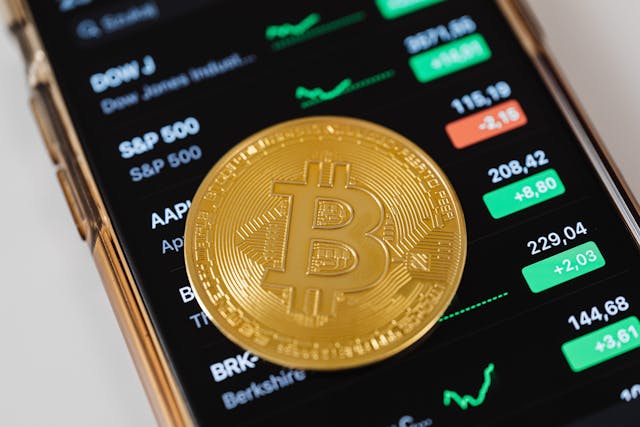Bitcoin’s emergence as a possible “digital gold” has sparked debates among investors and financial experts alike. As the first cryptocurrency, it has paved the way for others, yet it retains a certain prestige and dominance in the market. With its decentralized nature and global reach, it represents a paradigm shift in how we think about money and investments.
What is Bitcoin?
Bitcoin is a decentralized virtual currency that operates without the need for a central bank or government. It was created in 2009 by an unknown person using the name Satoshi Nakamoto. Transactions are made without the need for intermediaries and are recorded on a digital ledger called the blockchain. This means that bitcoin can be transferred directly between individuals without the need for a bank or other financial institution.
The concept of Bitcoin arose as a response to the financial crisis of 2008, which highlighted the potential issues of reliance on centralized financial systems. Its blockchain technology not only ensures security and transparency but also opens a new realm of possibilities for the future of decentralized systems.
Bitcoin has gained popularity in recent years as it has been accepted as a form of payment by various companies and merchants. It has also gained attention from investors and traders due to its high volatility and potential for large returns. Its digital nature and ease of transfer across borders make it a unique investment opportunity that was not possible before the advent of blockchain technology.
Why People Think Bitcoin is a Good Investment
There are a few reasons why people believe bitcoin is a good investment:
High Returns
One of the main reasons people are interested in investing in bitcoin is the potential for high returns. Bitcoin’s price has gone through several highs and lows over the years, but overall, its value has increased significantly. In 2017, bitcoin reached an all-time high of nearly $20,000. This has led many to believe that investing in bitcoin can yield high returns.
Additionally, as traditional markets become increasingly volatile, some investors have turned to bitcoin as an alternative investment that is not correlated with stock markets or bound by the same geopolitical and economic forces. The narrative of bitcoin as a potential hedge against inflation has also been gaining traction, especially in the wake of unprecedented government spending and monetary easing around the world.
Limited Supply
Unlike traditional currency, there is a limited supply of bitcoin. Only 21 million bitcoins can ever be created, and currently, around 18.5 million have already been mined. This means that as demand for bitcoin increases, the price may also increase due to its limited supply.
The scarcity of bitcoin is often compared to precious metals like gold, which have been used as a store of value for centuries. The concept of digital scarcity is one of the fundamental value propositions of bitcoin, and it is this attribute that has attracted many investors who are looking for assets that can retain value over time.
Growing Acceptance
As mentioned earlier, more and more companies are starting to accept bitcoin as a form of payment. This growing acceptance may lead to an increase in demand for the virtual currency, potentially driving up its value.
The trend of mainstream acceptance is not limited to small companies; major corporations and financial institutions are beginning to embrace bitcoin and other cryptocurrencies. This legitimizes bitcoin’s place in the financial ecosystem and suggests that it could become an integral part of the global economy, further bolstering the argument for its investment potential.

Why People Think Bitcoin is Not a Good Investment
On the other hand, there are also several reasons why some people do not believe bitcoin is a good investment:
High Volatility
While bitcoin’s high volatility may be attractive to some investors, it can also be a deterrent to others. The value of bitcoin can fluctuate greatly in a short period of time, which can lead to significant gains or losses. This makes it a risky investment for those looking for stability in their portfolio.
The volatility of bitcoin is often cited as a reason for caution, as it can result in a roller-coaster ride for investors. While some traders thrive on this volatility, using it to their advantage in short-term trading, it can pose a significant risk for those who are not accustomed to such rapid fluctuations in their investment value.
Lack of Regulation
As bitcoin is a decentralized currency, it is not regulated by a central authority. This means that there is no government oversight or protection for investors. This lack of regulation can make some investors hesitant to invest in bitcoin.
The absence of regulation has been both a curse and a blessing for bitcoin. On one hand, it allows for freedom from government control and the potential for innovation in the financial sector. On the other hand, it also means that there are fewer safety nets for consumers, and the market is more susceptible to manipulation and fraudulent activities.
Security Concerns
As with any digital currency, there is always a risk of security breaches and hacking. In the past, there have been several high-profile hacks of bitcoin exchanges, leading to the loss of millions of dollars. This can make some investors wary of investing in bitcoin.
The issue of security extends beyond just the exchanges; it also encompasses the safekeeping of one’s private keys, which are necessary to access bitcoin holdings. The responsibility of securing these keys lies solely with the individual, which adds an additional layer of complexity and potential risk.

Is Bitcoin a Good Investment for You?
So, is bitcoin a good investment for you? The answer is not a simple yes or no. It ultimately depends on your individual financial goals, risk tolerance, and investment strategy.
Asset Allocation
One of the main factors to consider when deciding whether or not to invest in bitcoin is asset allocation. Asset allocation is the process of dividing your investments among different asset classes, such as stocks, bonds, and cash. The goal of asset allocation is to create a diversified portfolio that can help manage risk and potentially increase returns.
Bitcoin is often seen as a high-risk, high-reward investment. This means that if you are looking to balance out your portfolio with lower-risk investments, bitcoin may not be the best option for you. However, if you have a higher risk tolerance and are looking for a potential high-return investment, bitcoin may be a good addition to your portfolio.
Including bitcoin or other cryptocurrencies in your investment portfolio could potentially enhance overall returns, especially if they are allocated appropriately alongside traditional investments. It’s about finding the right balance that aligns with your investment goals and risk profile.
Long-Term vs. Short-Term Investing
Another factor to consider is your investment time horizon. If you are looking to invest in bitcoin for the long-term, then its high volatility may not be as much of a concern. You can hold onto your investment and wait for potential gains over time. On the other hand, if you are looking to make a quick profit, bitcoin’s volatility may not work in your favor.
For those with a long-term perspective, the daily price swings might be less relevant than the overall trajectory of the market. A long-term investor might be more interested in the technology’s potential to change the financial landscape and the implications for bitcoin as an asset class.
Personal Research and Knowledge
Before investing in bitcoin, it’s important to do your own research and understand the virtual currency. While it may seem like a good investment based on its popularity and potential for high returns, it’s important to understand the risks involved and how it fits into your overall investment strategy.
Educating yourself on the intricacies of cryptocurrency, the technology behind it, and the market dynamics can provide a better foundation for making an informed decision. It’s also crucial to stay updated on regulatory developments and market trends that could impact the value and stability of bitcoin.
Alternatives to Investing in Bitcoin
If you’re still unsure about investing in bitcoin, there are other ways to potentially profit from the virtual currency without actually buying it. Some alternatives include:
Bitcoin Futures
Bitcoin futures allow investors to speculate on the price of bitcoin without actually owning it. This can be a good option for those looking to invest in bitcoin without the risk of storing and securing the actual currency.
Futures contracts can provide a way for investors to gain exposure to bitcoin’s price movements while potentially mitigating some of the risks associated with direct ownership, such as theft or loss.
Blockchain Technology
Blockchain technology is the underlying technology behind bitcoin and other cryptocurrencies. It’s essentially a digital ledger that records all bitcoin transactions. Investing in companies that are developing or utilizing blockchain technology may be a less risky way to potentially profit from the growth of bitcoin.
By investing in the technology itself rather than the currency, investors can tap into the broader applications of blockchain, which extend far beyond cryptocurrencies and into areas such as supply chain management, digital identity, and more.
Final Thoughts
So, is bitcoin a good investment? The answer ultimately depends on your individual financial goals, risk tolerance, and investment strategy. While it has the potential for high returns, it also comes with high volatility and security concerns. Before investing in bitcoin, be sure to do your own research and understand the risks involved.





























